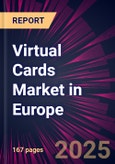Speak directly to the analyst to clarify any post sales queries you may have.
The report offers an up-to-date analysis regarding the current market scenario, the latest trends and drivers, and the overall market environment. The market is driven by high adoption of contactless payment solutions, increasing internet penetration globally, and growing focus on customer satisfaction.
The study was conducted using an objective combination of primary and secondary information including inputs from key participants in the industry. The report contains a comprehensive market size data, segment with regional analysis and vendor landscape in addition to an analysis of the key companies. Reports have historic and forecast data.
The virtual cards market in europe is segmented as below:
By Product
- B2B virtual cards
- B2C remote payment virtual cards
- B2C POS virtual cards
By Application
- Business use
- Consumer use
By Geographical Landscape
- Europe
The report on the virtual cards market in europe covers the following areas:
- Virtual Cards Market in Europe sizing
- Virtual Cards Market in Europe forecast
- Virtual Cards Market in Europe industry analysis
The report presents a detailed picture of the market by the way of study, synthesis, and summation of data from multiple sources by an analysis of key parameters such as profit, pricing, competition, and promotions. It presents various market facets by identifying the key industry influencers. The data presented is comprehensive, reliable, and a result of extensive primary and secondary research. The market research reports provide a complete competitive landscape and an in-depth vendor selection methodology and analysis using qualitative and quantitative research to forecast accurate market growth.
Table of Contents
Executive Summary
The following companies are recognized as the key players in the virtual cards market in europe: Aion SA, AirPlus, Apple Inc., Bank of China Ltd., Barclays PLC, Bharti Airtel Ltd., bunq B.V., Capital One Financial Corp., Klarna Bank AB, Marqeta Inc., Mastercard Inc., Mindtree, Monese Ltd., Qonto, Revolut Ltd., Skrill Ltd., Stripe Inc., and WEX Inc..Commenting on the report, an analyst from the research team said: "The latest trend gaining momentum in the market is emergence of nfc-based payment technology."
According to the report, one of the major drivers for this market is the high adoption of contactless payment solutions.
The study was conducted using an objective combination of primary and secondary information including inputs from key participants in the industry. The report contains a comprehensive market and vendor landscape in addition to a SWOT analysis of the key vendors.
Companies Mentioned (Partial List)
A selection of companies mentioned in this report includes, but is not limited to:
- Aion SA
- AirPlus
- Apple Inc.
- Bank of China Ltd.
- Barclays PLC
- Bharti Airtel Ltd.
- bunq B.V.
- Capital One Financial Corp.
- Klarna Bank AB
- Marqeta Inc.
- Mastercard Inc.
- Mindtree
- Monese Ltd.
- Qonto
- Revolut Ltd.
- Skrill Ltd.
- Stripe Inc.
- WEX Inc.








